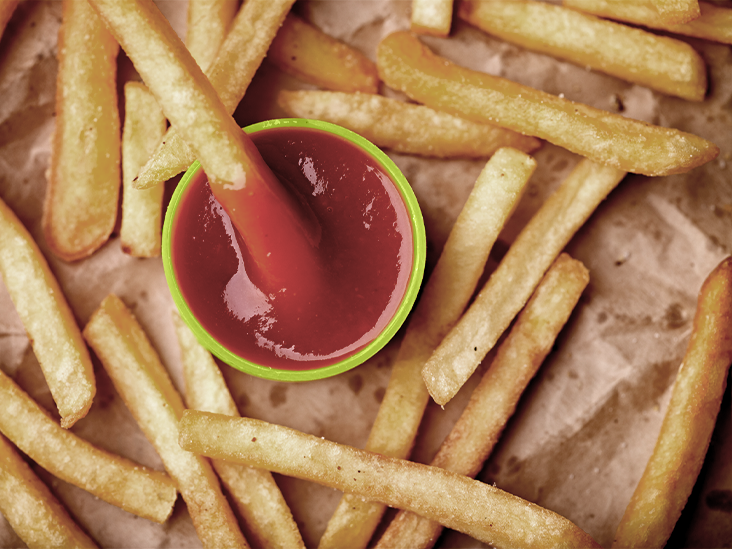

- Quick food poses certain health threats when eaten consistently, and professionals are operating to fully grasp its entire hazards, particularly regarding liver health.
- A latest review observed that consuming 20{d589daddaa72454dba3eae1d85571f5c49413c31a8b21559e51d970df050cb0e} or much more of day-to-day food consumption from quickly food resources can boost the possibility for nonalcoholic fatty liver disease.
- The dangers for creating nonalcoholic fatty liver sickness might be highest for persons with obesity or diabetic issues, the investigate notes.
Quickly meals is commonly accessible in the United States and quite a few other international locations in the globe as a swift food choice, but it can be harmful to try to eat this kind of food stuff regularly.
A latest research revealed in Clinical Gastroenterology and Hepatology examined the impression of rapid food items intake among the grown ups in the U.S. and its marriage to fats buildup in the liver.
The researchers uncovered that consuming 20{d589daddaa72454dba3eae1d85571f5c49413c31a8b21559e51d970df050cb0e} or far more of everyday energy from rapidly food stuff can increase the threat of developing fatty liver condition, also identified as steatosis.
Rapid foods features comfort to shoppers, and having fast meals is highly well-liked in the U.S. For instance, selecting up a pizza or fried chicken is normally a lot quicker than getting ready a food at property. However, rapidly foods choices often have large amounts of included salt and body fat and may well not be a excellent source of specified nutrients.
Tarra Bassi, board certified diet expert, who was not involved in the analyze, stated to Healthcare Information These days:
“Food served at fast-meals places to eat is usually significant in unwanted fat, calories, and sugar but reduced in vitamins and minerals and fiber. Although consuming the occasional rapid food stuff food isn’t a challenge, consuming it on a regular basis may raise your hazard of weight problems, heart attack, non-alcoholic fatty liver disorder, and other wellness issues.”
Just one ailment of fascination connected to speedy food stuff usage is
Individuals with nonalcoholic fatty liver ailment can experience cardiovascular ailment, liver most cancers, or conclude-phase liver illness as problems.
This study integrated older people ages 20 and older and utilized details from the National Overall health and Nourishment Evaluation Survey. Researchers analyzed facts from dietary recall surveys and measured steatosis within specific parameters.
In their examination of pretty much 4,000 grownups, 29{d589daddaa72454dba3eae1d85571f5c49413c31a8b21559e51d970df050cb0e} been given 20{d589daddaa72454dba3eae1d85571f5c49413c31a8b21559e51d970df050cb0e} or additional of their day-to-day calories from rapidly food sources.
Researchers uncovered that 20{d589daddaa72454dba3eae1d85571f5c49413c31a8b21559e51d970df050cb0e} or extra of everyday ingestion from speedy food was associated with increased steatosis. This association chance was most pronounced among people today who experienced obesity or diabetic issues.
Hence, the researchers say, the people today in these groups could see far more harmful consequences on their livers than these in the typical population.
Dr. Ani Kardashian, a hepatologist with Keck Drugs of USC, stated the key results to MNT:
“Eating at least one-fifth of total each day energy from fast foods (which is accurate of 29{d589daddaa72454dba3eae1d85571f5c49413c31a8b21559e51d970df050cb0e} of the U.S. population!) can increase the danger of fatty liver, which can lead to cirrhosis and its troubles, which include liver failure and liver most cancers. The adverse effects are notably extreme in persons who already have diabetes and being overweight.”
Dr. Kardashian famous that the study’s results could encourage folks to make much healthier foods decisions.
“My hope is that this analyze encourages people today to look for out far more wholesome, balanced foods alternatives and supplies information that clinicians can use to counsel their patients, significantly these with fundamental metabolic hazard elements, of the value of keeping away from foodstuff that are substantial in fats, carbs, and processed sugars,” she said.
The study did have a couple of limitations. First, since it was observational, it simply cannot verify that quick foodstuff consumption brings about fatty liver sickness.
Scientists could also not account for particular elements like geographic properties. They even further notice that the approaches they applied to evaluate steatosis only allowed for a specific degree of precision. Thus, more research could operate to employ much more precise measurement approaches.
Eventually, rapid foods consumption measurements relied on self-reporting from members, which has the threat of sure inaccuracies.
Dr. Kardashian underscored that more study would be required to totally “understand the influence of social determinants of overall health and meals insecurity on fast foodstuff intake in persons with continual ailments.”
“We also want to style, put into practice, and exploration wholesome food interventions for people today with metabolic ailments who are at higher chance of producing fatty liver to far better understand whether or not they can reverse or enhance fatty liver,” she added.
General, the analyze serves as a warning of the possible potential risks of regular quick foodstuff use.
With this awareness, individuals can make life style adjustments with aid from specialists as essential.
Jennifer Valdez, registered dietician with Memorial Hermann in Houston Texas, who was not concerned in the research, noted to MNT that this research showed an important association amongst quick food and illness chance.
“This examine showed that the much more commonly someone eats quick foodstuff, the better the possibility for acquiring nonalcoholic fatty liver illness. What was genuinely appealing to me, is that this risk is even greater in people who have co-morbidities, these types of as diabetes [or] weight problems,” she claimed.
“Healthcare suppliers should really be concentrating on this population [with comorbities] in get to give [preventive] and vital nutritious life-style counseling… Generally truly feel inspired to advocate for you in the course of annually check-up with your PCPs and inquire for diet/life style advice. Attain out to a registered dietitian for guidance on how to make acceptable, sustainable diet modifications.”
— Jennifer Valdez, registered dietician
Tarra Bassi even further made available a several way of life ideas for folks to lower their fast food items usage:
- Get started little: To reduce your speedy foods intake, commence tiny by slicing down the amount of times you are consuming it. For case in point, if you are ingesting rapidly food stuff 5 days per week, slice it down to three days per 7 days and preserve lowering the range of times each and every week or biweekly.
- Meal approach: Start out scheduling your foods for the week or at minimum five days of the week. Setting up out your foods enables you to be ready, so you never depend on finding quick foodstuff for a past-minute food.
- Take in well balanced foods: Be absolutely sure your meals are complete with a carbohydrate/fiber, protein, and fat. This will balance your blood sugar, minimize cravings, and help you truly feel total and pleased.





